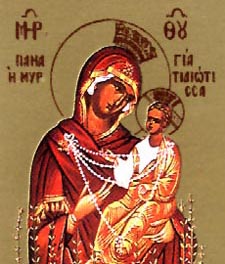Icon of the Mother of God “of the Myrtle Tree”

The Icon of the Most Holy Theotokos “Of the Myrtle Tree” (Myrtidiotissa) is in the monastery church of Myrtides on the Greek island of Kythera. It derives its name from the fact that it was found in a myrtle bush in the fourteenth century.
At that time, a shepherd was tending his sheep in a deserted valley which was filled with myrtle bushes. On September 24, forty days after the Dormition, the Mother of God appeared to him and told him to seek her icon which had been brought to that place many years before.
The shepherd fell to the ground in amazement, praying to the Theotokos. As soon as he got up and turned around, he saw the icon in the branches of a myrtle bush. Weeping for joy, he brought the icon home and told his friends and relatives about how he had found it.
When he awoke the next morning, the shepherd found the icon missing, and thought that perhaps someone had stolen it during the night. With a heavy heart, he led his sheep back to the spot where he had found the icon. To his amazement, he saw the icon once again in the branches of the myrtle bush. Glorifying God, the man took the icon home with him once more. The next morning, it had disappeared just as it had before. When this happened a third time, the shepherd realized that the Mother of God wanted her icon to remain where it had first appeared.
A small church was built to house the icon, and was called “Of the Myrtle Tree,” after the icon. The building was replaced and enlarged over the years, and many miracles took place there.
At the end of the sixteenth century Theodore Koumprianos, a descendant of the shepherd who found the icon, lived in the village of Kousoumari. He was a paralytic, and had an unshakeable faith that the Mother of God would heal him. Each year on September 24 he sent a family member to the church to light candles for him. One year he asked to be carried there by his family so that he might venerate the icon himself. During the Vigil, a great noise was heard coming from the direction of the sea. People fled the church, thinking that pirates were attacking. The paralytic remained in the church by himself, entreating the Mother of God for protection. Suddenly, he heard a voice from the icon telling him to get up and flee. He stood up, and then walked out of the church. Soon he was able to run and catch up with his relatives, who rejoiced upon seeing this miracle. As it turned out, there was no pirate attack, and the noise was regarded as a sign of God’s providence so that the paralytic could remain alone in church with the icon. Since that time the Koumprianos family has celebrated the icon’s Feast Day with a special reverence, since Theodore had been healed on that day.
Some of the other miracles associated with the Most Holy Theotokos and her icon “Of the Myrtle Tree” include protection of the island from the plague, ending the barrenness of a Jewish woman from Alexandria, saving people from death, and many other great wonders.
Pilgrims come to venerate the icon on the Feast of the Dormition (August 15), and also on the day of its discovery (September 24).
